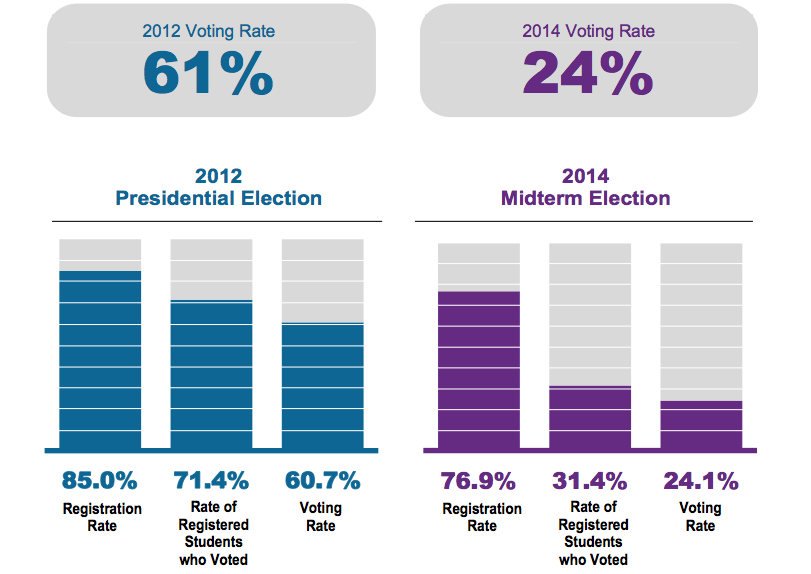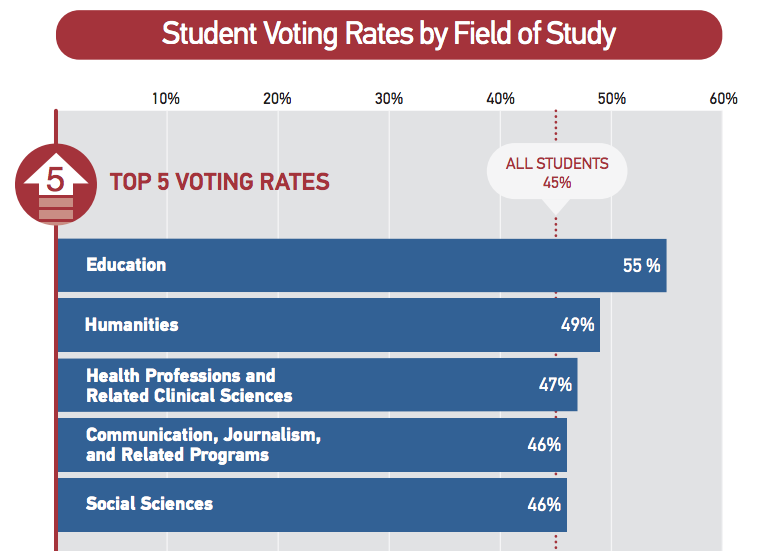The University of Florida’s campus report from a national study of college student voting participation follows a national trend: In national elections, a higher percentage of education majors vote than students in any other field of study.
The National Study of Learning, Voting and Engagement (NSLVE), conducted by the Institute for Democracy and Higher Education at Tufts University, involved 783 participating institutions of higher education and 7.4 million college students.
The findings reflected the percentage of each institution’s students who were eligible to vote and who actually voted in the 2012 presidential election and the 2014 midterm elections.
In the 2012 election, 65 percent of UF College of Education students voted – the highest rate among 20 fields of study on campus. That also is 10 points higher than the national average for all education students in the study.
Campuswide, UF’s student body surpassed the national average for college student voter turnout in 2012 with a 61 percent voting rate, well above the national average of 45 percent.
The 2014 national midterm election had a much lower voter turnout across the board, but UF education students maintained their high voter turnout with 38 percent, compared to 24 percent for all UF colleges. The national average was less than 19 percent—not even half the voting rate of UF education students.
UF Student Voter Participation Rates

Source: the NSLVE campus report for the University of Florida, showing voting percentages across all UF students.
Adam Gismondi, a program administrator at Tuft’s Institute for Democracy and Higher Education and, coincidentally, a graduate of the UF College of Education master’s program in Student Personnel in Higher Education, said it’s difficult to know why education majors vote at such a high rate.
“One possible explanation is the demographic makeup of the field of education, which leans heavily toward female students,” he said. “Women are more likely to vote than the average. Another explanation may be that the work being done in education majors tends to relate to issues intertwined with civics and politics. The students are likely engaging actively with social and political issues that raise civic awareness and foster a spirit of citizenship.”
Elizabeth Washington, a UF Social Studies Education professor and a senior fellow for the Florida Joint Center for Citizenship at UF, had this to say about the strong voting participation of UF education students: “I don’t have data to support my assertions, but my educated guess would be that our students have an immediate concern in public education that gets their attention and that they know it’s always a high-stakes political issue that impacts them personally.”
Nancy Thomas, director of the Tufts Institute for Democracy & Higher Education, remarked on the implications of different voting rates between students in various fields of study: “The fact that education and humanities majors vote at significantly higher rates than their peers in the STEM disciplines has both policy and political implications. We know that young people who engage in civic life early on develop lifelong habits. Regardless of their chosen field, all college and university students should be educated for democracy.”
Writer: Kelsie Ozanne, news and communications office, UF College of Education; kozanne@ufl.edu
Media Relations: Larry Lansford, director, news and communications, UF College of Education; 352-273-4173; llansford@coe.ufl.edu
